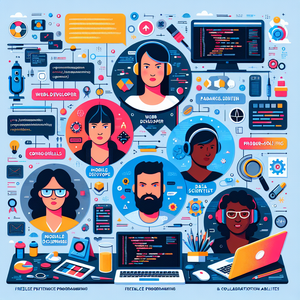
Navigating the Freelance Translation Landscape: Skills, Strategies, and Success Stories
In today's global marketplace, the role of freelance translators has never been more significant. As businesses seek to communicate with diverse audiences, the demand for skilled translators continues to surge. However, embarking on a freelance translation career requires more than just fluency in multiple languages. It calls for a deep appreciation of cultural nuances, domain-specific knowledge, and a robust understanding of business practices. While formal education can be beneficial, many successful translators come from varied backgrounds, possessing degrees in fields such as linguistics, literature, or even specialized areas like law or medicine. Building a successful freelance career involves crafting a varied portfolio, leveraging networking opportunities, and continually honing your translation skills. The journey to landing your first clients can take different paths: some swear by freelance platforms, while others advocate for direct outreach to potential clients. This guide aims to illuminate the myriad opportunities within the freelance translation arena, highlighting essential skills, qualifications, and practical tips that can pave the way for a rewarding career.
Job Summaries:
Freelance Translator:
- As a freelance translator, you will work to transform written content from one language to another, ensuring that clarity, accuracy, and cultural subtleties are respected.
- Your portfolio should showcase your expertise across various subject areas.
- Proficiency in at least two languages is crucial, along with a solid grasp of cultural contexts.
- Certifications from reputable organizations, like the American Translators Association, can bolster your credibility.
- Many translators have found success through targeted networking and establishing a strong online presence.
- Consider sharing your journey with potential clients to forge lasting connections.
Localization Specialist:
- Localization Specialists go a step beyond translation by adapting products and content to meet the cultural and linguistic expectations of specific markets.
- This role requires insights into local cultures, market trends, and consumer behaviors.
- Tasks might include translating marketing materials or ensuring that content resonates with local audiences.
- A background in marketing can enhance your effectiveness in this role.
- Think of how your unique experiences can inform your approach to localization, making you an invaluable asset to expanding companies.
Technical Translator:
- Technical Translators focus on translating documents in specialized fields like engineering, IT, or pharmaceuticals.
- Mastery of technical terminology and the ability to convey complex information clearly are vital.
- Common tasks include translating user manuals and scientific articles.
- A relevant degree combined with experience can set you apart in this competitive field.
- Consider sharing anecdotes about challenging translations you’ve navigated to highlight your expertise.
Medical Translator:
- Medical Translators handle healthcare-related documents, from patient records to medical research.
- A thorough understanding of medical terminology is non-negotiable.
- The ability to convey sensitive information accurately is essential.
- Typically, a background in healthcare or medical translation certification is required.
- The stakes are high in this role, as inaccuracies can have serious implications.
- Personal stories about how your translations impacted patient care can resonate deeply with potential clients.
Legal Translator:
- Legal Translators specialize in translating legal documents, such as contracts and court filings.
- A firm grasp of legal terminology and concepts in both source and target languages is essential.
- This role often requires a law degree or legal experience.
- Legal Translators are key players in international legal matters, helping clients navigate complex landscapes.
- Sharing your passion for legal translation can attract clients who value your dedication.
Subtitler/Captioner:
- Subtitlers and captioners create text representations of spoken dialogues for films and online content.
- This role involves translating spoken words while adapting text for timing and cultural relevance.
- Familiarity with subtitle software can enhance your employability.
- A love for media and storytelling, coupled with strong language skills, can lead to a fulfilling career in this growing field.
- Consider crafting engaging narratives about your favorite projects to captivate potential clients.
Transcriptionist:
- Transcriptionists convert spoken content into written form, including interviews and lectures.
- Fluency in the source language and excellent typing skills are paramount.
- While formal education isn’t always required, attention to detail and familiarity with transcription software are advantageous.
- This role is critical in legal, medical, and corporate environments where accurate records are essential.
- Reflecting on the challenges and triumphs of transcription can make your profile more relatable to clients.
Proofreader for Translation:
- Proofreaders for Translation review translated documents for accuracy and coherence.
- Exceptional language skills and a keen eye for detail are must-haves.
- Tasks involve checking for grammatical errors and ensuring compliance with client guidelines.
- Experience in translation or a background in linguistics is often preferred.
- Sharing stories about times you caught crucial errors can demonstrate your value to potential clients.
Content Writer/Translator:
- Content Writer/Translators craft original content in one language while translating existing works.
- This role requires creativity, strong writing skills, and an understanding of the target audience.
- Tasks include researching topics and ensuring translations retain the original voice.
- A background in marketing or journalism can be beneficial.
- Using engaging narratives about your writing process can make your profile stand out.
Interpretation Translator:
- Interpretation Translators provide real-time translation during live events.
- This role demands quick thinking and excellent language skills to convey messages accurately on the spot.
- Familiarity with interpreting equipment is a plus.
- This dynamic role is crucial for facilitating communication in multilingual settings.
- Sharing personal experiences from live events can highlight your adaptability and skill.
The freelance translation landscape is rich with opportunities for those equipped with the right skills and determination. Each role plays a vital part in dismantling language barriers and fostering global communication. As you embark on your freelance journey, consider integrating insights from seasoned professionals, leveraging relevant platforms, and consistently refining your craft. Building a compelling narrative around your unique strengths and fostering a strong network can distinguish you in this competitive field. With dedication and the right approach, you can unlock a rewarding and successful career in freelance translation, one that not only fulfills you but also contributes to a more interconnected world.
Explore More Jobs

